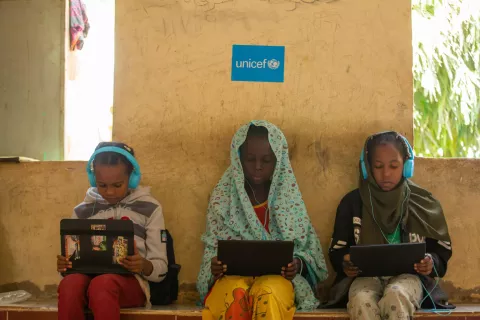UNICEF delivers urgent aid to besieged communities in Syria
During the month of February, UNICEF and its partners have been able to reach 100,000 people in besieged communities like Moadamiyeh and Kafr Batna

- Available in:
- English
- Español
Families in towns like Moadamiyeh and Kafr Batna have been in urgent need of aid. During the month of February, UNICEF and its partners have been able to reach 100,000 people in besieged communities. But so many more require assistance. Here, we join the most recent mission to Moadamiyeh.
MOADAMIYEH, Syrian Arab Republic, 24 February 2016 – Children were walking to school on a hazy Wednesday morning when the United Nations team pulled out of Moadamiyeh. UNICEF and its partners had just completed a delivery of much-needed aid for this besieged community of 45,000.
“What have you brought?” a child asked, rubbing his eyes, watching the truck disappear into the winter morning. “Food, I hope, and shoes. Mine are very old and became tight. You know, I am growing up.”
Entry into Moadamiyeh
Moadamiyeh, home to more than 19,000 children, is one of 18 besieged communities in the country cut off from humanitarian assistance. The mission’s 55 trucks had left Damascus 36 hours earlier, early Monday evening, following the long process of gaining approvals to move. After a period of waiting and negotiations at the town entrance, the team were given the green light at 3:30 p.m.
Moadamiyeh is just 10 km from downtown Damascus.
Support for families
This United Nations inter-agency convoy was the second to reach Moadamiyeh in a few days. Hundreds of children, women and men gathered to meet the team. UNICEF’s health and nutrition specialists worked fast to see as many mothers and children as possible.
A young mother held her 6-month-old baby, his face pinched like an old man’s. “That’s a symptom of severe acute malnutrition,” the UNICEF staffer explained to the mother as he examined the baby. He referred her to the local hospital, where UNICEF teams were delivering health and nutrition supplies.
On the other side of the street, another United Nations team member was surrounded by children and young people. “How much is a kilo of rice?” he asked. “Here, no one has food to sell,” a young man answered.
An older women approached and asked, “Do you have a lighter, please?”

“No, madame, I’m sorry. I don’t smoke,” replied another team member. Throughout the mission, others would ask for lighters. In this besieged town, lighters are a rare and expensive commodity.
“We have to make fire to cook or burn wood for warmth,” said one woman. “Our homes are damaged, the windows have all been blasted out. It gets very cold here at night.”
“You should spend the night here and feel it for yourselves – it’s unbearable,” said another woman, as she called her children to walk back home.
As the night wore on and 10 trucks were left to be unloaded, the operation continued in the dark. It is what the United Nations does in the Syrian Arab Republic. Access to such locations is rare. Once in, the team stays until the last box of humanitarian aid is delivered.
Stuck
“We haven’t had electricity for many years,” said Udai*, 9. “We have a fridge at home, but I have never seen it work.”
A girl, 13, began to cry. “Can you take her to her parents?” a man asked the UNICEF team. “She was visiting her older sister, my wife, when the road was blocked. She is fine. She is healthy. But she misses her parents.”
A woman chimed in, “Not only her. There are many people stuck here like her, including myself.”
End of the mission
By midnight, only those who helped unload trucks and a few others remained. Nader, 12, watched men standing in line to transfer food rations from a truck into a storage facility.
He was wearing a thin pullover. “This is not cold weather,” he said. “It was really cold when it was snowing here this winter and even colder the previous winter. But then I had a warm coat, and now it’s too small, so my younger brother wears it.”
*Names have been changed to protect children’s identities.
During this mission, UNICEF delivered 16 trucks loaded with 8,000 winter kits. Each kit is for one child and includes a winter jacket, trousers, a woollen sweater, thermal underwear, socks, gloves, a hat and a pair of shoes. The aid consignment also included 7,300 packs of 24 diapers. During the first convoy to Moadamiyeh a few days earlier, UNICEF’s priority was to deliver urgently needed health and nutrition supplies.
On the same day as this mission, another UNICEF team joined the United Nations inter-agency convoy delivering aid to Kafr Batna. The United Nations had not been able to enter the besieged town with humanitarian assistance since May 2014. As Kafr Batna has a population of 39,000, including about 17,000 children, UNICEF prioritized delivery of critical health and nutrition supplies in this breakthrough first convoy.
Building on the five United Nations inter-agency convoys the previous week, UNICEF and its partners have delivered support to more than 100,000 people in besieged communities during the month of February. However, more than 4.6 million people – more than two million of them children – live in hard-to-reach locations across the country, including 486,700 in besieged locations like Moadamiyeh and Kafr Batna.
As the deadline for a national cessation of hostilities nears this Saturday, UNICEF and partners are urgently calling for unimpeded, unconditional and sustained access to all 13.5 million people in need across the country.




